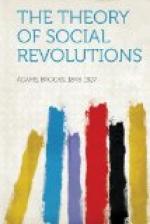Marshall, in a series of decisions, laid down a general principle which had been proved to be sound when applied by ordinary courts, dealing with ordinary social forces, and operating under the corrective power of either a legislature or a praetor, but which had a different aspect under the American constitutional system. He held that the fundamental law, embodied in the Constitution, commanded that all contracts should be sacred. Therefore he, as a judge, had but two questions to resolve: First, whether, in the case before him, a contract had been proved to exist. Second, admitting that a contract had been proved, whether it had also been shown to have been impaired.
Within ten years after these decisions it had been found in practice that public opinion would not sustain so rigid an administration of the law. No legislature could intervene, and a pressure was brought to bear which the judges could not withstand; therefore, the Court yielded, declaring that if impairing a contract were, on the whole, for the public welfare, the Constitution, as Marshall interpreted it, should be suspended in favor of the legislation which impaired it. They called this suspension the operation of the “Police Power.” It followed, as the “Police Power” could only come into operation at the discretion of the Court, that, therefore, within the limits of judicial discretion, confiscation, however arbitrary and to whatever extent, might go on. In the energetic language of the Supreme Court of Maine: “This duty and consequent power override all statute or contract exemptions. The state cannot free any person or corporation from subjection to this power. All personal, as well as property rights must be held subject to the Police Power of the state."[22]
Once the theory of the Police Power was established it became desirable to define the limits of judicial discretion, but that proved to be impossible. It could not be determined in advance by abstract reasoning. Hence, as each litigation arose, the judges could follow no rule but the rule of common sense, and the Police Power, translated into plain English, presently came to signify whatever, at the moment, the judges happened to think reasonable. Consequently, they began guessing at the drift of public opinion, as it percolated to them through the medium of their education and prejudices. Sometimes they guessed right and sometimes wrong, and when they guessed wrong they were cast aside, as appeared dramatically enough in the temperance agitation.
Up to about the middle of the last century the lawfulness of the liquor business had been unquestioned in the United States, and money had been invested as freely in it as in any other legitimate enterprise; but, as the temperance agitation swept over the country, in obedience to the impulsion given by science to the study of hygiene, dealing in liquor came to be condemned as a crime. Presently legislatures began to pass statutes to confiscate, more or less completely, this




